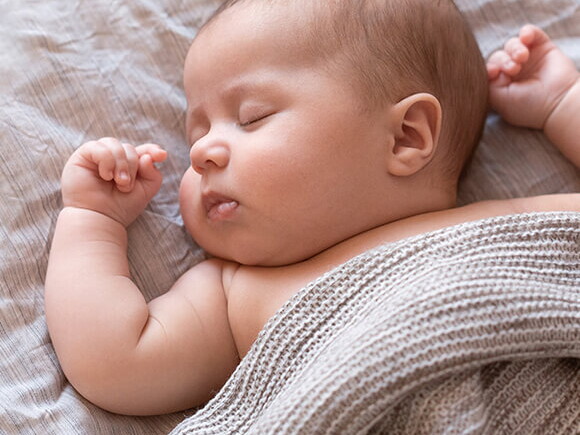
How much sleep does a baby need?
Why is sleep important for my baby?1
Sleep plays a vital role in nurturing your baby's growth and development. It contributes to enhancing and shaping various aspects of their well-being, including:
- Attention span
- Mood regulation
- Language acquisition
- Learning abilities
- Motor skills development
How do baby sleep patterns differ from adult sleep patterns?1
- Every individual experiences a sleep cycle where different stages of sleep occur. While adults typically have sleep cycles lasting around 90 minutes, babies' sleep cycles are shorter, approximately 40 minutes. Consequently, babies tend to wake up more frequently.
- There are two main types of sleep:
- Rapid eye movement (REM) sleep, also known as 'active' or 'light' sleep
- Non-REM sleep, also referred to as 'deep' or 'quiet' sleep
- Adults and adolescents generally have more non-REM sleep, characterized by stillness and deep breathing.
- In contrast, babies naturally spend more time in REM sleep, which is essential for:
- Brain development
- Memory formation
- During REM sleep, babies may exhibit shallow breathing, limb twitching, eye fluttering, and making noises. They are more easily aroused from REM sleep.
As babies grow, they transition to having less REM sleep and more deep sleep.
How baby sleep changes from 2 to 12 months2
As babies age from 2 to 12 months, their sleep patterns undergo several changes:
- Daytime sleep decreases.
- Wake periods between naps extend.
- Nighttime sleep durations increase, with fewer awakenings.
- Overall, babies require less total sleep.
How much sleep does your baby need?3
Just like adults, babies, and kids don't all sleep the same amount. Some need more, some need less. Here's a breakdown of how much sleep they usually need in a day, including naps:
- Newborns: Babies just born snooze a lot—most of the time. They can sleep anywhere from 8 to 18 hours a day. They'll wake up at night to eat, and sometimes if they're too hot or cold.
- 3 to 6 Months Old: As babies get older, they need less nighttime feeding and can sleep longer stretches. Some might sleep for 8 hours or more at night by 4 months, sleeping longer at night than during the day.
- 6 to 12 Months Old: By this age, some babies can sleep for up to 12 hours straight at night, and they might not need those nighttime feeds anymore. But teething or hunger can still wake them up.
- 12 Months and Beyond: After their first birthday, babies generally sleep around 12 to 15 hours in total.
- 2-Year-Olds: Toddlers at this age usually sleep about 11 to 12 hours at night, plus they might take 1 or 2 naps during the day.
- 3 to 4-Year-Olds: Most kids between 3- and 4 years old need around 12 hours of sleep, but it can be anywhere from 8 to 14 hours. Some might still need a daytime nap.
Handling disturbed nights3
- When babies are brand new, they tend to wake up a lot during the night for the first few months. This can make nights tough to handle.
- If you have someone else helping you, like a partner, don't hesitate to ask for their support. If you're using formula, suggest that your partner share the feeding responsibilities. If you're breastfeeding, see if your partner can handle the early morning diaper changes so you can catch some extra sleep.
- Once you've settled into a routine with breastfeeding, your partner might be able to give you a bottle of expressed breast milk during the night now and then. If you're on your own, consider reaching out to a friend or family member who could stay over for a bit to help you catch up on sleep.
Dealing with baby sleep pattern changes3
- Babies tend to change their sleep patterns as they grow. Just when you think you've got it all figured out and everyone's getting some rest, the next night might bring more frequent wake-ups.
- Stay flexible with your routines as your baby grows and moves through different phases. Keep in mind that growth spurts, teething, and sickness can all disrupt your baby's sleep.
If your baby is having trouble sleeping, or if you need more guidance on establishing a routine, don't hesitate to reach out to your health visitor for advice.
Resources:
- Baby sleep patterns by age. Pregnancy, Birth and Baby -the Australian Government. Last reviewed: May 2023. Available at: https://www.pregnancybirthbaby.org.au/sleep-patterns-for-babies Last access at: 24.03.2024.
- Suitable for 2-12 months: Baby sleep: 2-12 months. raisingchildren.net.au Last updated or reviewed 31-03-2021. Available at: https://raisingchildren.net.au/babies/sleep/understanding-sleep/sleep-2-12-months Last access at: 24.03.2024.
- Helping your baby to sleep. NHS Page last reviewed: 8 December 2021. Available at: https://www.nhs.uk/conditions/baby/caring-for-a-newborn/helping-your-baby-to-sleep/ Last access at: 24.03.2024.

